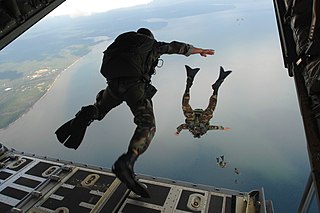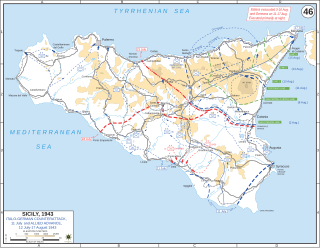
The British Army is the principal land warfare force of the United Kingdom, a part of the British Armed Forces along with the Royal Navy and the Royal Air Force. As of 1 October 2023, the British Army comprises 75,983 regular full-time personnel, 4,097 Gurkhas, 26,546 volunteer reserve personnel and 4,548 "other personnel", for a total of 111,174.

The Falklands War was a ten-week undeclared war between Argentina and the United Kingdom in 1982 over two British dependent territories in the South Atlantic: the Falkland Islands and its territorial dependency, South Georgia and the South Sandwich Islands. The conflict began on 2 April 1982, when Argentina invaded and occupied the Falkland Islands, followed by the invasion of South Georgia the next day. On 5 April, the British government dispatched a naval task force to engage the Argentine Navy and Air Force before making an amphibious assault on the islands. The conflict lasted 74 days and ended with an Argentine surrender on 14 June, returning the islands to British control. In total, 649 Argentine military personnel, 255 British military personnel, and three Falkland Islanders were killed during the hostilities.

The Royal Air Force (RAF) is the United Kingdom's air and space force. It was formed towards the end of the First World War on 1 April 1918, becoming the first independent air force in the world, by merging the Royal Flying Corps (RFC) and the Royal Naval Air Service (RNAS). Following the Allied victory over the Central Powers in 1918, the RAF emerged as the largest air force in the world at the time. Since its formation, the RAF has played a significant role in British military history. In particular, during the Second World War, the RAF established air superiority over Hermann Göring's Luftwaffe during the Battle of Britain, and led the allied strategic bombing effort.
The Special Operations Executive (SOE) was a secret British World War II organisation. It was officially formed on 22 July 1940 under Minister of Economic Warfare, Hugh Dalton, by the amalgamation of three existing secret organisations. Its purpose was to conduct espionage, sabotage and reconnaissance in occupied Europe against the Axis powers, and to aid local resistance movements.

The 1948 Arab–Israeli War, also known as the First Arab–Israeli War, followed the civil war in Mandatory Palestine as the second and final stage of the 1948 Palestine war. It formally began following the end of the British Mandate for Palestine at midnight on 14 May 1948; the Israeli Declaration of Independence had been issued earlier that day, and a military coalition of Arab states entered the territory of Mandatory Palestine in the morning of 15 May.

The Third Battle of Ypres, also known as the Battle of Passchendaele, was a campaign of the First World War, fought by the Allies against the German Empire. The battle took place on the Western Front, from July to November 1917, for control of the ridges south and east of the Belgian city of Ypres in West Flanders, as part of a strategy decided by the Allies at conferences in November 1916 and May 1917. Passchendaele lies on the last ridge east of Ypres, 5 mi (8 km) from Roulers, a junction of the Bruges-(Brugge)-to-Kortrijk railway. The station at Roulers was on the main supply route of the German 4th Army. Once Passchendaele Ridge had been captured, the Allied advance was to continue to a line from Thourout to Couckelaere (Koekelare).

The Special Air Service (SAS) is a special forces unit of the British Army. It was founded as a regiment in 1941 by David Stirling, and in 1950 it was reconstituted as a corps. The unit specialises in a number of roles including counter-terrorism, hostage rescue, direct action and covert reconnaissance. Much of the information about the SAS is highly classified, and the unit is not commented on by either the British government or the Ministry of Defence due to the secrecy and sensitivity of its operations.

Operation Market Garden was an Allied military operation during the Second World War fought in the German-occupied Netherlands from 17 to 27 September 1944. Its objective was to create a 64 mi (103 km) salient into German territory with a bridgehead over the Nederrijn, creating an Allied invasion route into northern Germany. This was to be achieved by two sub-operations: seizing nine bridges with combined US and British airborne forces ("Market") followed by British land forces swiftly following over the bridges ("Garden").

Airborne forces are ground combat units carried by aircraft and airdropped into battle zones, typically by parachute drop. Parachute-qualified infantry and support personnel serving in airborne units are also known as paratroopers.

The Battle of the Somme, also known as the Somme offensive, was a battle of the First World War fought by the armies of the British Empire and the French Third Republic against the German Empire. It took place between 1 July and 18 November 1916 on both sides of the upper reaches of the river Somme in France. The battle was intended to hasten a victory for the Allies. More than three million men fought in the battle, of whom more than one million were either wounded or killed, making it one of the deadliest battles in all of human history.

Operation Torch was an Allied invasion of French North Africa during the Second World War. Torch was a compromise operation that met the British objective of securing victory in North Africa while allowing American armed forces the opportunity to begin their fight against Nazi Germany and Fascist Italy on a limited scale. It was the first mass involvement of US troops in the European–North African Theatre and saw the first big airborne assault carried out by the United States.

A commando is a combatant, or operative of an elite light infantry or special operations force, specially trained for carrying out raids and operating in small teams behind enemy lines.

The Normandy landings were the landing operations and associated airborne operations on Tuesday, 6 June 1944 of the Allied invasion of Normandy in Operation Overlord during World War II. Codenamed Operation Neptune and often referred to as D-Day, it is the largest seaborne invasion in history. The operation began the liberation of France, and the rest of Western Europe, and laid the foundations of the Allied victory on the Western Front.

The Allied invasion of Sicily, also known as the Battle of Sicily and Operation Husky, was a major campaign of World War II in which the Allied forces invaded the island of Sicily in July 1943 and took it from the Axis powers. It began with a large amphibious and airborne operation, followed by a six-week land campaign, and initiated the Italian campaign.

The North African campaign of the Second World War took place in North Africa from 10 June 1940 to 13 May 1943. It included campaigns fought in the Libyan and Egyptian deserts and in Morocco and Algeria, as well as Tunisia. The campaign was fought between the Allies and the Axis Powers. The Allied war effort was dominated by the British Commonwealth and exiles from German-occupied Europe. The United States officially entered the war in December 1941 and began direct military assistance in North Africa on 11 May 1942.

Operation Unthinkable was the name given to two related possible future war plans developed by the British Chiefs of Staff Committee against the USSR during 1945. The plans were never implemented. The creation of the plans was ordered by British Prime Minister Winston Churchill in May 1945 and developed by the British Armed Forces' Joint Planning Staff in May 1945 at the end of World War II in Europe.

Operation Overlord was the codename for the Battle of Normandy, the Allied operation that launched the successful liberation of German-occupied Western Europe during World War II. The operation was launched on 6 June 1944 (D-Day) with the Normandy landings. A 1,200-plane airborne assault preceded an amphibious assault involving more than 5,000 vessels. Nearly 160,000 troops crossed the English Channel on 6 June, and more than two million Allied troops were in France by the end of August.

Special forces or special operations forces (SOF) are military units trained to conduct special operations. NATO has defined special operations as "military activities conducted by specially designated, organized, selected, trained and equipped forces using unconventional techniques and modes of employment".

The Secret Intelligence Service (SIS), commonly known as MI6, is the foreign intelligence service of the United Kingdom, tasked mainly with the covert overseas collection and analysis of human intelligence on foreign nationals in support of its Five Eyes partners. SIS is one of the British intelligence agencies and the Chief of the Secret Intelligence Service ("C") is directly accountable to the Foreign Secretary.

















